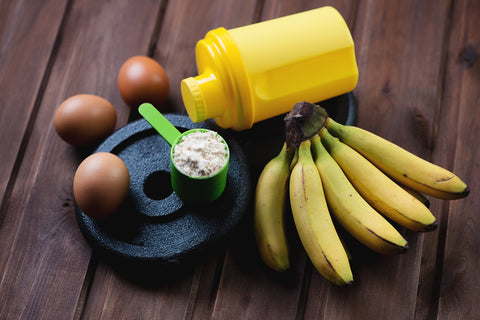In the world of fitness and physical activity, whether you're a dedicated runner, cyclist, swimmer, or just someone who enjoys staying active, one crucial element often takes centre stage: Protein.
As dedicated athletes lace up their shoes or hop on their bikes, they know that proper nutrition is essential for peak performance. Among the various nutrients that play a crucial role in supporting their active lifestyles, protein stands out as a cornerstone for runners and cyclists alike. It plays a vital role in supporting and enhancing performance, recovery, and overall well-being. Let’s delve into why protein is paramount and how you can ensure you're getting enough to support your goals.
Understanding Protein's Role:
Protein, often hailed as the building block of life, serves a multitude of functions within the human body. For athletes engaged in endurance activities like running and cycling, protein plays a pivotal role in several key areas:
Muscle Repair and Growth: The repetitive nature of running and cycling leads to microscopic damage in muscle fibres. Protein is instrumental in repairing these fibres, promoting faster recovery, and facilitating muscle growth. Protein is comprised of amino acids, which are the fundamental building blocks of muscle tissue. Consuming an adequate amount of protein post-workout aids in rebuilding and strengthening muscles, thus enhancing performance over time.

Maintenance of Lean Muscle Mass: Endurance activities can lead to the breakdown of muscle tissue, especially during prolonged sessions. Protein consumption helps mitigate muscle loss by providing amino acids, the building blocks of protein, which are essential for maintaining lean muscle mass.
Energy Provision: While carbohydrates are the primary fuel source during endurance exercises, protein can also contribute to energy production, particularly during prolonged workouts. Consuming protein-rich snacks or meals before and during extended runs or rides can help sustain energy levels and stave off fatigue.
Immune Function: Intense physical activity regimens can temporarily suppress the immune system and make athletes more susceptible to illnesses and infections. Protein plays a crucial role in supporting immune function by aiding in the production of antibodies and supporting tissue repair and other immune system components, thereby helping athletes stay healthy and consistent in their training.

Meeting Protein Needs: While the importance of protein for runners and cyclists is clear, meeting their specific protein needs requires attention to both quantity and quality. Here are some guidelines to ensure adequate protein intake:
Determine Protein Requirements: Individual protein needs vary based on factors such as body weight, training intensity, and goals. As a general guideline, endurance athletes may aim for a daily protein intake of 1.2 to 2.0 grams per kilogram of body weight. Consulting with a sports nutritionist or dietitian can provide personalized recommendations.
Distribute Protein Intake: To optimize muscle protein synthesis and recovery, athletes should aim to evenly distribute their protein intake throughout the day, including pre-and post-workout meals or snacks. Incorporating a source of protein in each meal can help maintain a steady supply of amino acids for muscle repair and growth.
Choose Quality Protein Sources: While protein can be found in both animal and plant-based foods, focusing on high-quality sources is essential. Lean meats, poultry, fish, eggs, dairy products, legumes, nuts, and seeds are all excellent sources of protein. Athletes can also consider supplementing with protein powders or shakes, especially when convenience is a priority.
Timing Matters: Consuming protein within the post-exercise recovery window, typically within 30 minutes to two hours after a workout, is crucial for maximizing muscle repair and glycogen replenishment. Including a combination of protein and carbohydrates in this post-workout meal or snack can enhance recovery and adaptation.

Protein plays a critical role in supporting the unique needs of individuals with active lifestyles, including runners, cyclists, swimmers, and fitness enthusiasts. From muscle repair and growth to enhanced endurance and performance, adequate protein intake is essential for optimizing athletic performance and supporting overall health and well-being.
By understanding their protein needs and incorporating high-quality sources into their diet, athletes can fuel their runs and rides with the nutrients necessary for success. Whether it's a post-run protein shake or a protein-packed meal, embracing the power of protein is a choice that can propel athletes toward their fitness aspirations, one stride or pedal at a time.





